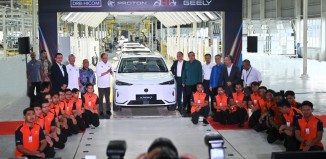ATLAS-L4 Driverless Truck Project Successfully Concludes In Germany
The once-futuristic vision of autonomous heavy-duty trucks navigating highways has now moved closer to commercial reality, thanks to the successful completion of the ATLAS-L4 project in Germany. Backed by a €59.1 million budget and spearheaded by a twelve-member consortium including MAN Truck & Bus, the project delivered a Level 4 autonomous truck capable of operating on public highways in a hub-to-hub logistics setting.
Over the past 3 years, roughly 150 engineers from various academia, industry, and tech institutions collaborated to develop and test a fully autonomous commercial vehicle under real-world conditions, marking a major milestone in Logistics 4.0 and autonomous mobility in Europe. Working on this project are MAN Truck & Bus, Knorr-Bremse, Leoni, Bosch, Fernride, BTC Embedded Systems, Fraunhofer AISEC, Technical University of Munich, Technical University of Braunschweig, TÜV SÜD, Autobahn GmbH and the Würzburg Institute of Transport Sciences (WIVW GmbH).
First Use Of Germany’s Autonomous Driving Law For Trucks
The ATLAS-L4 project (Automated Transport between Logistics Centres on Level 4 Motorways) leveraged Germany’s 2021 legislation allowing autonomous vehicles on defined routes under technical supervision. This made Germany one of the first countries globally to legally support autonomous driving in a structured manner.
The development team integrated safety-critical, redundant systems for steering, braking, and vehicle electronics into the autonomous truck platform. A validation framework was also created to support safe public road trials, which included motorway drives accompanied by safety drivers and real-time monitoring. 
“Together with our partners, we have set ourselves a high goal and realised an industrialisable basic concept for autonomous driving in hub-to-hub use. The development and integration of the redundant components required for safe use, such as steering, brakes and the vehicle electrical system, as well as the creation of a validation concept required interdisciplinary expertise and close teamwork. As a consortium, we have proven ourselves with this project: Autonomously driving trucks are feasible!” commented Dr Frederik Zohm, Executive Board Member for Research and Development at MAN Truck & Bus, adding, “Innovations such as autonomous driving require such collaborations in order to effectively advance future technology in Germany and Europe.”
Road Trials & Milestones Achieved
The project kicked off in January 2022, with the first-ever Level 4 test approval for a commercial vehicle, issued in April 2024, by the Federal Motor Transport Authority. This green light allowed for public road testing, which included a high-profile debut drive with Germany’s Federal Transport Minister Volker Wissing onboard.
Throughout the testing period, the vehicle’s automation software underwent continuous updates, with extensive data collection and real-world refinement ensuring its road-readiness. In addition to technical milestones, cybersecurity protocols – including encrypted communications and system redundancy, were also validated.
The results of the ATLAS-L4 project were showcased in early May at the ADAC Mobility Test Centre in Penzing. Around 200 industry stakeholders and government representatives attended live driving demonstrations, a 1,000-square metre exhibition, and a series of scientific presentations highlighting the research behind the milestone. 
Blueprint For The Future Of Freight Transport
While ATLAS-L4 ends as a research project, it leaves behind a prototype technology framework that serves as a blueprint for future series production. Key insights into safety architecture, vehicle-to-infrastructure communication, and control centre integration will now be used to accelerate the rollout of autonomous freight solutions.
“We have done valuable pioneering work by providing practical proof of the technical feasibility of autonomous trucks,” said project coordinator Sebastian Völl, MAN Truck & Bus. “These concepts are now being incorporated into further development work for the series development of autonomous trucks.”
A Solution To Industry-Wide Challenges
As the freight and logistics sector deals with the ever-present labour shortages and increasing demand for efficiency, driverless trucks offer a compelling solution. Germany currently faces a shortage of around 100,000 truck drivers, which is a gap automation could help close. Autonomous hub-to-hub transport can also reduce congestion, improve road safety, and enhance supply chain reliability.


























